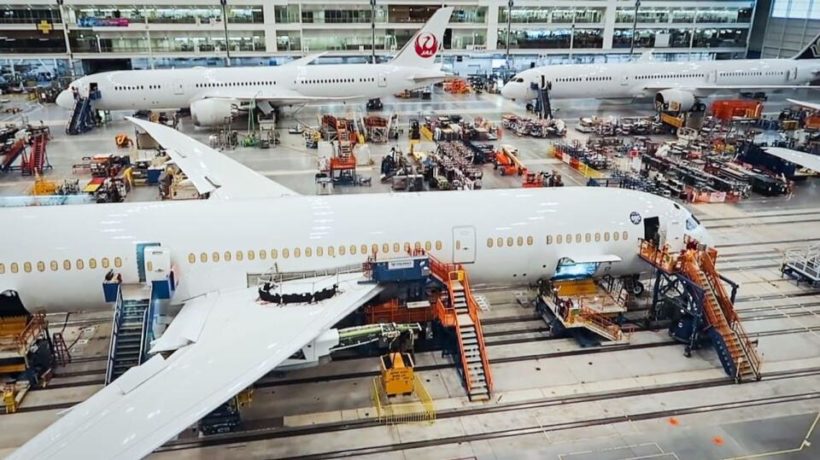Much like Love, Actually, Netflix’s new documentary Downfall: The Case Against Boeing starts off at the airport. So many reunions, vacations, and business trips are about to begin or conclude. And what everyone involved has in common is the shared faith that they will arrive at, and be delivered from, their destination in one piece.
It’s smart to start off Downfall by grounding viewers in the context of this sacred trust, because it shows how much is at stake when it is broken. The Sundance hit, which lands on Netflix February 18, chronicles the crashing of two Boeing 737 Max planes that took place between late 2018 and early 2019, killing a combined 346 people. While Downfall starts as an engrossing forensic investigation into what went wrong with the planes, though, it ultimately zooms out to reveal that what may have caused these crashes is a reckless, greedy corporate culture.
Before diving into the details, it’s important to have a sense of Boeing’s stature in the aviation industry, which director Rory Kennedy readily provides. Boeing’s invention of the 747 in the late 1960s created international air travel as we know it today. It’s one of those grand American achievements that serves as a source of patriotic pride. The company managed to stay relevant far beyond its pioneering days, too. At any given moment, the film informs us, roughly 10,000 Boeing aircrafts are in service in more than 150 countries. The company’s reputation is so sterling, in fact, that after the first of the two crashes, some experts simply could not fathom that the fault might lie with the plane’s design.
“I mean, it was a Boeing!” says Jon Ostrower, editor-in-chief of The Air Current.
On October 29, 2018, Lion Air flight 610, a Boeing 737 Max aircraft, took off in Jakarta, Indonesia, and promptly crashed into the Java Sea minutes later, killing everyone on board. The technical causes for the crash are complicated, but they involve a faulty sensor and a controversial system called MCAS (Maneuvering Characteristics Augmentation System), which automatically responded to it. As Wall Street Journal reporter Andy Pasztor dug into the surprising story, what seemed to shock him the most was Boeing’s response. Instead of coming clean with a technical explanation for what went wrong and why, the company quietly pushed behind the scenes to make the xenophobic case that the crash would never have happened with an American pilot.
Just 19 weeks later, Ethiopian Airlines flight 302—another Boeing 737 Max aircraft—left Addis Ababa and crashed near the town of Bishoftu, again killing everyone aboard. In the immediate aftermath of this second crash, the Federal Aviation Administration (FAA) waited for more data before deciding whether to ground all Boeing 737 Maxes. China didn’t need any more data, however, unilaterally deciding to ground its supply of the aircraft one day after the crash, setting off a chain reaction of other countries doing the same. Once the black box for the plane was found, revealing similar data to the Lion Air crash five months earlier, President Trump ground the aircraft in America, too.
In order to ground an entire line of aircraft, pilots have to fly each one to a storage facility. To give an idea of the fear lurking around Boeing 737 Maxes at that moment, Downfall reveals that several pilots outright refused to perform this task.
As for Boeing, the company continued trying to pass blame for the crashes onto the pilots and avoid accountability, even as the ground beneath them crumbled. It’s at this point in the film that director Kennedy goes back in time to explain some crucial recent Boeing history.
Through interviews with former Boeing employees, aviation experts, journalists, members of U.S. Congress, the families of victims, and of course Chesley “Sully” Sullenberger, a clear picture emerges. The 1997 merger between Boeing and McDonnell Douglas is apparently where things started to go wrong. Suddenly, a company known for excellence in engineering and innovation seemed to revolve exclusively around increasing shareholder value. Around this time, Boeing also started getting more and more competition from Airbus in Europe, until the latter finally overtook Boeing in sales in 2003. At that point, a former employee asserts, Boeing basically stopped listening to its engineers. Corners were cut, as were quality-control measures, and whistleblowers were reportedly dismissed. Boeing executives didn’t seem to want to hear any internal bad news that might affect the company’s standing on Wall Street.
Downfall elucidates in detail the path from this corporate mindset to the eventual crashes, and leaves viewers to stew over the institutionalized greed that made it possible. This is by no means a problem exclusive to Boeing. Just about every modern company operates under the unreasonable demand of an ever-upward financial trajectory. If a CEO can’t top the profits of the previous year, they might be out on their ass, which doesn’t bode well for what the next CEO might do to achieve arbitrary financial benchmarks.
If the drive for profits over people keeps going this way, it won’t just be our collective trust in air safety that takes a hit. Nobody will feel safe anywhere.
ABOUT THE AUTHOR
Joe Berkowitz is an opinion columnist at Fast Company. His latest book, American Cheese: An Indulgent Odyssey Through the Artisan Cheese World, is available from Harper Perennial.







